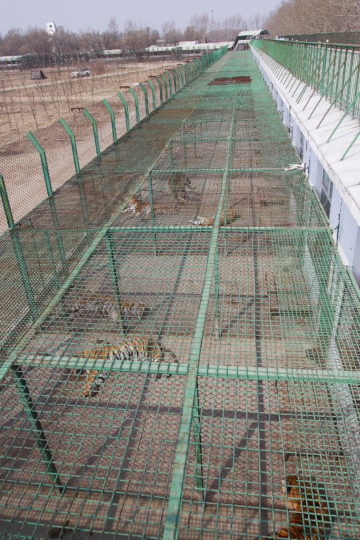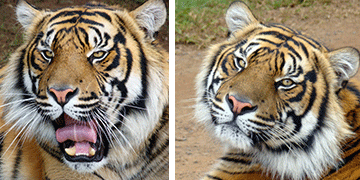Presidents of China, U.S. hold fate of ‘Noah’ and the ‘ark’ in their hands
Presidents of China, U.S. hold fate of ‘Noah’ and the ‘ark’ in their hands
Call it superpower leadership, sibling rivalry, or rising to the occasion. Whatever the label, the presidents of China and the United States have joined forces to literally save the world.
This is how the world achieved game-change on climate change: U.S. President Barack Obama and China’s President Xi Jinping spoke one-on-one about concerns over human-caused greenhouse gas (GHG) emissions speed-warming the planet. The U.S. acknowledged that it, too, has a problem with GHG emissions. Then the world’s number one and number two GHG emitters—China and the U.S. respectively—jointly pledged to limit their climate impacts and lead the world to do the same.
Something similar is happening with ivory. Britain’s Prince William raised concerns about China’s ivory consumption in a private meeting with President Xi Jinping. The U.S. acknowledged that it, too, has an ivory trade problem. The U.S. burned six tons of ivory stockpiles in a gesture of good faith, after which China burned 6.1 tons. Then China and the U.S.—the world’s number one and number two largest consumers of wildlife—made a joint pledgeto stop ivory trafficking at home and abroad, and to ban legal domestic ivory trade. The U.S. announced a “near-total” ban on ivory trade the week before this month’s China-U.S. Strategic and Economic Dialogue, after which China announced it would set a timetable by the end of the year for phasing out commercial trade in ivory.
Through these bold, unprecedented measures, Presidents Xi and Obama may save humanity from climatic catastrophe and elephants from extinction. Will they go a step further and help the other wild species—such as tigers and rhinos—that are being hunted down for their commercially valuable parts?
When I went to China for the first time in 1991 to investigate bear farming, I learned the country intended to farm bears and a long list of other rare and threatened species “just like cows and pigs,” as my main government escort phrased it. In fact, China’s Wildlife Protection Law mandated the farming of this long list of wildlife for commercial trade and consumption. What most people do not know is that China now battery farms tigers and has recently begun farming rhinos, all under blessing of the country’s Wildlife Protection Law. 
This law is up for revision now, and Chinese legislators, business leaders, conservationists, animal welfare advocates, and celebrities have pushed for the farming and consumption mandates to be removed. Unfortunately, China’s State Forestry Administration—the agency charged with protecting species in the wild—helped start, build and promote bear, tiger, and rhino farms. This is the same agency that advocated for so-called “limited” legal international trade in ivory on behalf of China’s ivory traders, which resulted in the recent wholesale slaughter of African elephants, undermining the 1989 international trade ban that has allowed them to make a dramatic comeback in the wild.
Surveys have repeatedly shown that majorities of Chinese people support bans on trade in ivory, tiger bone, and rhino horn. However, the results of a new study by Chinese researchers also found that consumers in China continue to prefer wild-sourced products over farmed-raised because they believe those from the wild are more effective. In other words, if trade in these commodities becomes legal again, buyers will prefer those taken from the wild.
“For many species, commercial breeding and legalized trade in farmed products will have the opposite effect to what is desired for conservation,” according to another new study. “[The] main reasons are consumers’ preference for wild products…and laundering of illegal products into the legal wildlife trade.”
Researchers from Princeton University and the University of California at Berkeley just releasedresults from their analysis of the repercussions of “limited” legal ivory trade from Africa to China and Japan in 2008. “The intuition that legalization will reduce illegal production is not always true,” said co-author Nitin Sekar, who began the study as a graduate student at Princeton and received his doctorate in 2014. “The economic intuition was that if we allow the sale of some legal ivory in Japan and China, then there would be fewer people left to purchase it illegally. We found that that intuition was incorrect. The black market for ivory responded to the announcement of a legal sale as an opportunity to smuggle even more ivory.” Said Sekar’s co-author Solomon Hsiang, now an associate professor of public policy at UC Berkeley: “I used to be a strong believer in legalization as a crime-reducing policy, but this has really forced me to rethink that. [W]hen people talk about legalization, it may be smart in some cases, but in which cases is not as obvious. This is a case study for how wrong it can go.”
So, why is China’s State Forestry Administration in the business of promoting rather than stopping trade—legal and illegal—in parts and products from endangered species when that approach went so dramatically wrong with elephant ivory? It all goes back to China’s Wildlife Protection Law. When the law debuted the 1980s, it not only mandated the farming and consumption of wildlife, but deemed the endeavor virtuous and of great benefit to the People’s Republic of China. This mandate grew from Mao Zedong’s emphasis on animal husbandry as a cornerstone to the success of Communist China. Mao’s regime even ordered the People’s Liberation Army (PLA) to help ensure the success of animal husbandry and also medicine manufacturing. Scholars have noted that China’s decision to join CITES—the Convention on International Trade in Endangered Species of Wild Fauna and Flora—in 1981 went against the priorities of the Ministry of Foreign Trade and Economic Cooperation, the Ministry of Public Health, and the PLA. In fact, the PLA was “implicated in protecting the smugglers of tiger bone and rhino horn” after China banned their importation to comply with CITES.
The PLA, several government ministries, pharmaceutical manufacturers, as well as provincial and municipal governments invested money and manpower in establishing China’s bear and tiger farming industries, the country’s new rhino horn farming effort, and unsuccessful attempts to farm musk deer and pangolins. Another key player was China’s Northeast Forestry University, which, until recently, produced all of the country’s biologists—some of whom hold key leadership positions in today’s State Forestry Administration. This is why the only way to stop this growing drive for commodification of bears, tigers, rhinos, and dozens of other wild species is to take the matter out of the hands of those married to these mandates from the past, which, like the unmitigated burning of fossil fuels, are proving dangerous to Earth as the global community knows and loves it.
Nothing short of Xi Jinping and Barack Obama forging a bilateral agreement like their climate and ivory agreements will stop the enduring and expanding effort to commodify a long list of the world’s most beloved wild species. As the joint China-U.S. climate statement of November 2014 says: “The seriousness of the challenge calls upon the two sides to work constructively together for the common good.”
